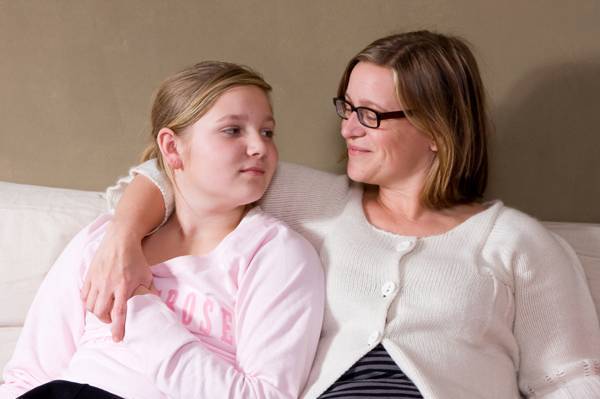Talking To Your Child About Puberty

Puberty is an important milestone of anyone’s life and so is talking about the issues of puberty. Children today are exposed to information banks on TV and the internet that points directly to relationships and sex. By the time they approach puberty they are already familiar with advanced ideas on the subject itself. So why is it that important to have ‘the talk’? Because not all the sources they are availing information from are reliable. You will have to approach them and not keep waiting until they ask you themselves because that may never happen, especially if they feel that it is not an OK subject to discuss with parents.
One major thing to make sure is that you are honest and open to their questions. Answer them honestly but with caution. Studies show that children should know the changes that will come along with puberty – physical as well as emotional. Does that seem like way too young to you? But consider this, children are growing up way faster now and most girls are wearing training bras by then and you will notice the change in the boys’ voices just a few years further.
Timing, when do you talk to them?
Most girls are seen to have their first period around the age of 12 and 13, about two years after their body has initiated puberty. But let’s not forget that while some girls may need to wait till they are 16 or 17, there are also others who get them as early as the age of 9. If the child is not aware of what is happening, they can be frightened by the location and sight of blood. That brings us to when we should talk to the daughters about menstruation. You must talk to them ahead of time, to avoid a complicated situation and keep them prepared and expect changes in their body.

Now the boys on an average begin going through puberty later than the girls. They will see the signs only towards age 10 or 11. But don’t get me wrong, some of them may also start to develop sexually long before they start to look old enough.
Children nowadays do receive sex education at their schools as most schools include the subject as compulsory or in workshops to keep the children informed from the right source. Often, the girls hear about periods and training bras while the boys are spoken to about their changing voices and erection. An important part about this is that just as they are told about the changes in their own body they should be educated about the change in the opposite gender too.
It’s a good idea to review the lessons taught at school during these years about the physical growth of girls and boys with your child, since children often have pertaining questions about certain topics.
What will you say?
To be reassuring is essential while talking to children about puberty. It is easy for them to feel insecure and alone with all the changes with the onset of puberty. Change in appearance one of their greatest worries but it will help them to know that everybody goes through them and it is not something to feel shy or awkward about. They should also be told that the timing of the changes can be very different. Hormonal changes, acne, mood swings, and hair growth – it’s all just part of growing up and they are not alone. Not everyone gets it at the same pace.
It can sure be upsetting to your daughter if she is the first one in the class or among her friends to get a training bra or to get her period first, for example. The same goes for your sons, if he is an early bloomer – the rough, deep voice or the growth of facial hair before anyone else may make him feel awkward and out-of-place. Children tend to take a good look at the sudden changes in their friends or classmates and there’s nothing that can be done towards that end. But it will all be well with your reassurance and support.
Children should be informed about the following:
- Girls’ body will turn more rounded, especially around the hips and legs.
- Girls’ breast begin to swell and then grow bigger in size.
- Girls and boys get pubic as well as underarm hair. The little hair on their legs becomes thicker and darker than before.
- Both girls and boys have growth spurts and often get acne. They also start to sweat more.
- Boys’ penises and testicles grow larger and their voices change to a much deeper tone.
- Boys’ voices change and become deeper.
- Boys grow facial hair and their muscles get bigger and more prominent.
- Boys sometimes have wet dreams i.e. they ejaculate in their sleep.
- When the girl’s menstruating begins she gets them once in a month. This is a normal biological aspect of her body – her uterine lining fills with blood to prepare for a fertilized egg; if the egg isn’t fertilized, she will have a period. Whereas if the egg is fertilized, she will become pregnant.
- A girl’s period may last for 3 days to one week, and she will use sanitary napkins (or pads) or even tampons to absorb this blood.
Common Questions that children as
It isn’t surprising that children have a lot of questions when they learn about puberty. Give them the opportunity and time to ask these questions and answer them as honestly and thoroughly as possible. Below are some questions that are commonly asked by children and the answers to them;
What is this hard clump/lump in my breast?
There is nothing to be worried about, girls do usually get small and sometimes sore or painful lumps below the nipples as the breasts are still developing. This is perfectly normal and the hard lumps and tenderness will be gone in time as the breasts continue to grow in size.
Why are my breasts so large (or so small)?
The size of the breast is different from one person to the other and no matter what reassure your child that all breasts are beautiful whether they are big or small. Your child may find it hard to acknowledge or appreciate this but in the end the size of the breast will in no way affect her attractiveness or the ability to breastfeed if she becomes a mother someday.
Why is my penis tiny (or so big)?
The focus can be on the penis for boys and they will have doubts and concerns related to that too. All boys don’t develop at the same time or at the same speed as each other so similar anxieties may also be shown by them. Penises also develop in different sizes but there is nothing to be worried about here too. The size will keep changing as he keeps growing up, he only need to be assured that it’s all well and fine.
Why don’t I have pubic hair yet?
Pubic hair develops in some teens sooner than others, but every one of them is going to grow them, just as with their heights or breast size, every one develops pubic hair. The amount or thickness of the pubic hair depends on individual traits too.
I’m a boy, so why do I have breasts?
Temporary breast growth is not uncommon in boys during puberty. This condition is called gynecomastia. Gynecomastia is sometimes found in newborn babies too. For teenagers, this is caused by the imbalance in hormones during puberty and it usually only lasts for about six months to two years.
Need some more tips?
Your child should know that you will be available to talk at any time and that their concerns are important to you. As a parent, you can initiate conversations as it is your duty to discuss puberty with your child – discussing the feelings associated with these changes are equally important too. Answer their questions as openly as you can. Even if you feel uncomfortable or a little awkward discussing these sensitive topics, it will probably make your child relieved to have you speaking to them about it. It is a relief for them on the longer run if they aren’t comfortable immediately and it will also become easier for you both to discuss sensitive matters as and when required.
Answering their questions will be easier if you are confident about your knowledge in the subject. If the conversation is not entirely comfortable you can practice before you speak and let your child know that even if there is discomfort, it is an important talk to have. Now, even after this discussion, if there are still questions that you think you cannot answer, ask your doctor for advice. Puberty is a phase of life that we have all been through and given the social setting now we should be present for our children through their transition and let them know that there is nothing to worry about.


